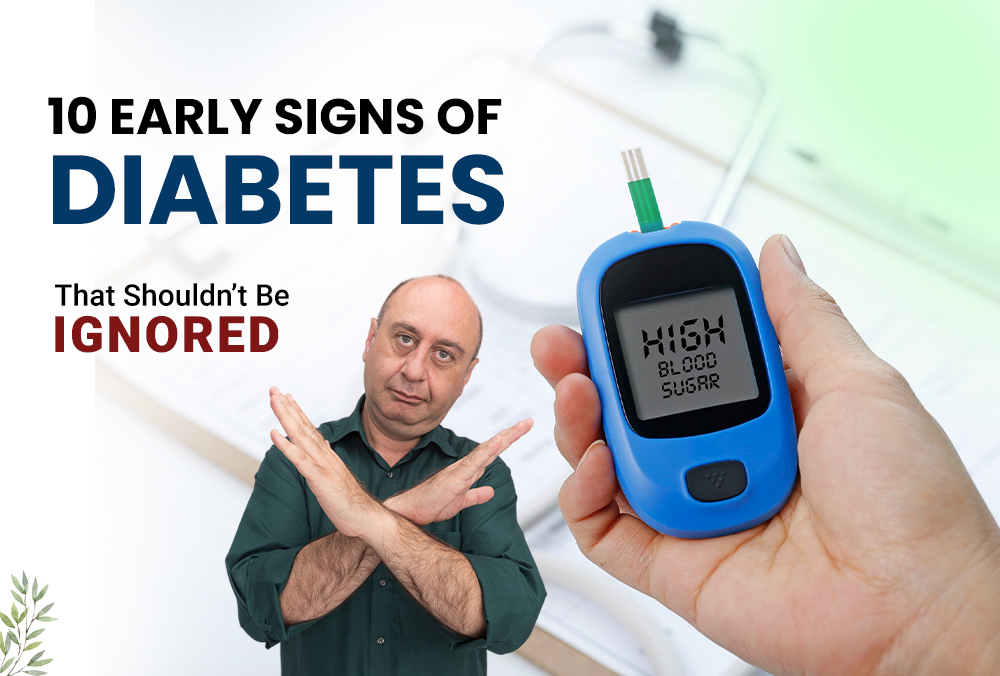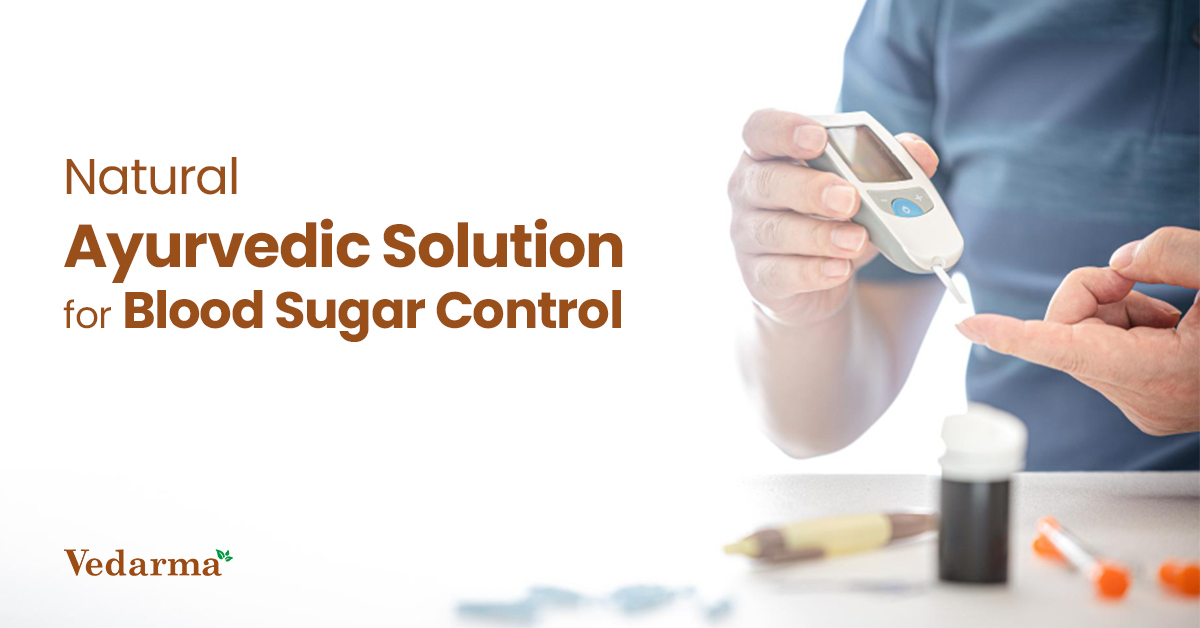10 Early Signs of Diabetes That Shouldn’t Be Ignored

Diabetes is not a choice, but how you live with it is.
– Brett Andreas
Did you know diabetes is quickly becoming one of the biggest health problems in the world? India has the second-highest number of people with diabetes.
In 2021, more than 74 million Indians had diabetes, and experts say this number could go over 124 million by 2045.
With so many people around the world living with diabetes, you might think everyone knows the early signs. But that’s not true! High blood sugar can cause slow, sneaky symptoms that many people don’t notice. Some might show clear signs, while others might not know they have diabetes until a doctor tells them.
Recognizing the early signs of diabetes is crucial. It helps you keep your blood sugar levels healthy and avoid serious complications like strokes and heart problems.
Understanding Diabetes
Diabetes occurs when your body either doesn’t produce enough insulin or can’t effectively use the insulin it does produce. Insulin is a hormone that regulates blood sugar levels. When blood sugar levels are too high (hyperglycemia) or lower than normal (hypoglycemia), various health problems can arise.
There are two primary types of diabetes:
Type 1 Diabetes: This autoimmune condition occurs when the body’s immune system attacks and destroys insulin-producing cells in the pancreas.
Type 2 Diabetes: The most common type, it’s often linked to lifestyle factors like obesity, sedentary behavior, and unhealthy diet.
Read more : Diabetes Care
What Are The 10 Early Signs Of Diabetes?
Let’s explore the ten early signs of diabetes that you should be aware of.
1. Dark Patches on the Neck

What to Look For: One of the early signs of diabetes can be dark, velvety patches of skin, especially around the neck.
Other Affected Areas: These patches can also show up in the armpits or groin.
Why It Happens: This condition, called acanthosis nigricans, is caused by high insulin levels in your blood or insulin resistance, which is common in type 2 diabetes.
How It Works: In type 2 diabetes, your body’s cells don’t respond well to insulin, leading to higher blood sugar levels. The pancreas compensates by producing more insulin, causing skin cells to grow faster and form darker patches.
2. Persistent Fatigue and Weakness

Energy Needs: Your body relies on glucose for energy, and insulin helps transport glucose into cells.
Issue with Diabetes: With diabetes, glucose can’t enter cells due to either insufficient insulin or insulin resistance, leaving you with plenty of glucose in your blood but low cellular energy.
End Result: This results in constant fatigue and makes it hard to stay active, leading to an overall feeling of lethargy.
3. Unexplained Weight Loss

Unexpected Change: Losing weight suddenly without trying or changing your diet can signal diabetes.
Underlying Mechanism: High blood sugar leads to frequent urination as the kidneys work to eliminate excess glucose, causing loss of water and calories.
Energy Source Shift: Your body starts using muscle and fat for energy, leading to weight loss.
4. Slow Healing of Wounds

Delayed Recovery: If cuts and wounds take longer to heal, this can be an early sign of diabetes.
Impact of High Blood Sugar: Elevated blood sugar levels make blood vessels less elastic and narrow, reducing blood flow.
Healing Process: This hampers the supply of nutrients and oxygen necessary for wound healing.
5. Recurrent Infections

Increased Risk: Diabetes weakens your body’s ability to heal wounds, increasing the risk of infections.
Immune System: High blood sugar impairs the immune system, making it harder for white blood cells to fight infections.
Bacterial Growth: Excess sugar provides food for bacteria and yeast, making infections more common, especially urinary tract and yeast infections in women.
Gum Health: Inflamed gums can also be a sign of diabetes and can lead to serious dental issues if not treated.
6. Frequent Urination

Day and Night: Needing to urinate frequently, during both day and night, is a common early sign of diabetes.
Kidney Response: When there’s too much sugar in the blood, the kidneys work overtime to remove it, increasing urine production.
Medical Term: This condition, called polyuria, is a symptom of both type 1 and type 2 diabetes.
7. Increased Thirst

Constant Hydration: If you find yourself constantly thirsty despite drinking lots of water, it could be due to diabetes.
Kidney Function: Your kidneys work extra hard to flush out the excess sugar, making you feel thirsty more often.
Medical Term: This excessive thirst is known as polydipsia and is common when blood sugar levels are high.
8. Extreme Hunger

Energy Source: Your cells need glucose from the food you eat for energy.
Diabetes Effect: In diabetes, glucose stays in the blood instead of reaching the cells, making you feel hungry even after meals.
Medical Term: This feeling of extreme hunger is called polyphagia or hyperphagia.
9. Blurred Vision

Vision Changes: Sudden vision changes can be a sign of high blood sugar.
Fluid Impact: Diabetes can cause fluid to leak into the lens of the eye, causing it to swell or change shape, resulting in blurry vision.
Recovery: Vision typically returns to normal once blood sugar levels are stabilized.
10. Dry, Itchy Skin

Fluid Loss: High blood sugar makes your body pull fluid from cells to produce urine, leading to dry and itchy skin.
Nerve Impact: Diabetes affects the nerves that control skin moisture, reducing sweat production and causing dryness, especially in the lower legs.
Nerve damage (neuropathy): It is caused by high blood sugar levels and can lead to tingling, numbness, or pain in the hands and feet.
Read more : History Of Ayurveda: A Brief Overview (In Hindi)
DiabAssist (Tablets): A Natural Way to Manage Blood Sugar and Cholesterol Levels
For those looking to control their blood sugar levels naturally, Vedarma offers DiabAssist Tablets. Specifically formulated for diabetic patients, DiabAssist tablets are a powerful solution to regulate both glucose and lipid metabolism. These tablets are formulated with natural ingredients known for their anti-diabetic properties.
DiabAssist Tablets help in:
Stamina and Sugar Support: Reduces sugar levels, and boosts stamina, and insulin secretion effectively.
Pancreatic Health Booster: Regenerates cells, and enhances enzyme activity for healthy utilization.
Energize & Normalize: Tones the body, and regulates glucose, and lipid metabolism for normalization.
Vitality and Metabolic Balance: Balances metabolism, boosts vitality, and promotes overall health effectively.
Incorporating DiabAssist Tablets into your daily routine can help maintain optimal blood sugar and cholesterol levels naturally, contributing to a healthier, more balanced life. Recognizing the early signs of diabetes and taking proactive steps with products like DiabAssist can make a significant difference in managing your health.
Conclusion
Recognizing the early signs of diabetes is crucial for timely intervention and management. Increased thirst, frequent urination, unexplained weight loss, extreme hunger, fatigue, blurred vision, slow-healing sores, tingling in hands and feet, darkened skin areas, mood changes, and persistent itching are significant early indicators. By staying vigilant and seeking medical advice if these symptoms are present, you can take control of your health.
In addition to conventional treatments, natural solutions like Vedarma’s DiabAssist Tablets can help manage diabetes naturally and effectively. Embrace a healthier lifestyle, stay informed, and take proactive steps to manage diabetes for a better quality of life.
FAQs
1. What are the common early signs of diabetes that I should be aware of?
Answer: Common early signs of diabetes include:
Dark Patches on the Neck: Look for dark, velvety patches, especially around the neck, armpits, or groin.
Persistent Fatigue and Weakness: Constant tiredness despite enough rest.
Unexplained Weight Loss: Sudden weight loss without changes in diet or exercise.
Slow Healing of Wounds: Cuts and wounds taking longer to heal.
Recurrent Infections: Frequent infections, especially urinary tract and yeast infections.
Recognizing these signs early can help in managing diabetes effectively.
2. How does high blood sugar cause persistent fatigue and weakness?
Answer: In diabetes, high blood sugar means that glucose can’t enter the cells due to insufficient insulin or insulin resistance. Since glucose is the primary energy source for your cells, this results in low energy levels, causing persistent fatigue and weakness even if you’re getting enough rest.
3. Why does diabetes lead to frequent urination and excessive thirst?
Answer: When blood sugar levels are high, the kidneys work harder to remove excess glucose, which leads to frequent urination. As a result, your body loses more water, causing you to feel excessively thirsty. This cycle of frequent urination and increased thirst is a common symptom of diabetes.
4. What are the benefits of using DiabAssist Tablets for diabetes management?
Answer: DiabAssist Tablets offer several benefits, including:
Stamina and Sugar Support: Helps lower sugar levels and improves stamina.
Pancreatic Health Booster: Supports the health of pancreatic cells and enzyme activity.
Energize & Normalize: Aids in normalizing glucose and lipid metabolism.
Vitality and Metabolic Balance: Promotes overall health and metabolic balance.
Incorporating these tablets into your routine can be a natural way to manage diabetes and support a healthier lifestyle.
5. Can diabetes cause vision problems? What should I watch for?
Answer: Yes, diabetes can affect your vision. High blood sugar levels can cause fluid to leak into the lens of your eye, leading to swelling or changes in shape. This can make your vision blurry or fuzzy. If you notice sudden changes in your vision, such as blurriness or difficulty focusing, it’s important to consult a healthcare provider. Regular eye exams are crucial for detecting and managing diabetes-related vision issues early.
6. How can I manage diabetes naturally with DiabAssist Tablets?
Answer: DiabAssist Tablets are designed to help manage diabetes naturally by:
Supporting Insulin Function: They help improve insulin secretion and efficiency.
Balancing Blood Sugar Levels: Regulate glucose metabolism to maintain stable blood sugar levels.
Boosting Pancreatic Health: Enhance the function of pancreatic cells responsible for insulin production.
Promoting Overall Health: Natural ingredients in DiabAssist Tablets contribute to general vitality and metabolic balance.
Incorporating these tablets into your daily routine, along with a healthy lifestyle, can support better management of diabetes.
7. What lifestyle changes should I consider to complement the use of DiabAssist Tablets?
Answer: To complement the use of DiabAssist Tablets, consider the following lifestyle changes:
Healthy Diet: Focus on a balanced diet rich in vegetables, fruits, whole grains, and lean proteins. Limit sugary and processed foods.
Regular Exercise: Engage in physical activity regularly to help regulate blood sugar levels and improve overall health.
Adequate Hydration: Drink plenty of water to stay hydrated and support kidney function.
Routine Monitoring: Regularly check your blood sugar levels to track your progress and make necessary adjustments.
By combining these lifestyle changes with DiabAssist Tablets, you can better manage diabetes and improve your overall health.



